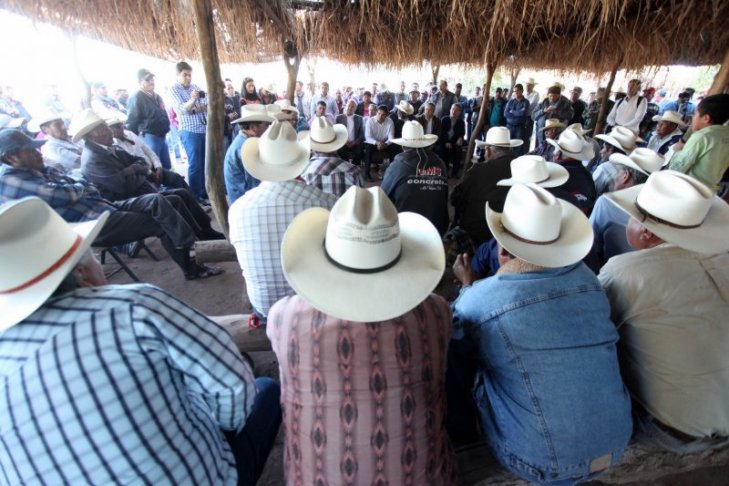Since Mexico privatized its oil and gas resources in 2013, border-crossing pipelines including those owned by Sempra Energy and TransCanada have come under intense scrutiny and legal challenges, particularly from Indigenous peoples.
Opening up the spigot for U.S. companies to sell oil and gas into Mexico was a top priority for the Obama State Department under Hillary Clinton.
Mexico is now facing its own Standing Rock-like moment as the Yaqui Tribe challenges Sempra Energy’s Agua Prieta pipeline between Arizona and the Mexican state of Senora. The Yaquis in the village of Loma de Bacum claim that the Mexican government has failed to consult with them adequately, as required by Mexican law.
Indigenous Consultations
Under Mexico’s new legal approach to energy, pipeline project permits require consultations with Indigenous peoples living along pipeline routes. (In addition, Mexico supported the adoption of the United Nations Declaration on the Rights of Indigenous Peoples, which includes the principle of “free, prior and informed consent” from Indigenous peoples on projects affecting them — something Canada currently is grappling with as well.)
It was a similar lack of indigenous consultation which the Standing Rock Sioux Tribe said was the impetus for lawsuits and the months-long uprising against the Dakota Access pipeline near the tribe’s reservation in Cannon Ball, North Dakota, in late 2016. Now, according to Bloomberg and Mexican reporter Gema Villela Valenzuela for the Spanish language publication Cimacnoticias, history is repeating itself in the village of Loma de Bacum in northwest Mexico.
Agua Prieta, slated to cross the Yaqui River, was given the OK by seven of eight Yaqui tribal communities. But the Yaquis based in Loma de Bacum have come out against the pipeline passing through their land, even going as far as chopping out a 25 foot section of pipe built across it.
“The Yaquis of Loma de Bacum say they were asked by community authorities in 2015 if they wanted a 9-mile tract of the pipeline running through their farmland — and said no. Construction went ahead anyway,” Bloomberg reported in a December 2017 story. “The project is now in a legal limbo. Ienova, the Sempra unit that operates the pipeline, is awaiting a judicial ruling that could allow them to go in and repair it — or require a costlier re-route.”
As the legal case plays out in the Supreme Court of Justice in Mexico, disagreements over the pipeline and its construction in Loma de Bacum have torn the community apart and even led to violence, according to Cimacnoticias.
Construction of the pipeline “has generated violence ranging from clashes between the community members themselves, to threats to Yaqui leaders and women of the same ethnic group, defenders of the Human Rights of indigenous peoples and of the land,” reported Cimacnoticias, according to a Spanish-to-English translation of its October 2016 story.
“They explained that there have been car fires and fights that have ended in homicide. Some women in the community have had to stay in places they consider safe, on the recommendation of the Yaquis authorities of the town of Bácum, because they have received threats after opposing signing the collective permit for the construction of the pipeline.”
TransCanada’s Troubles Cross Another Border
While best known for the Canada-to-U.S. Keystone XL pipeline and the years-long fight to build that proposed tar sands line, the Alberta-based TransCanada has also faced permitting issues in Mexico for its proposed U.S.-to-Mexico gas pipelines.
According to a December 2017 story published in Natural Gas Intelligence, TransCanada’s proposed Tuxpan-Tula pipeline is facing opposition from the indigenous Otomi community living in the Mexican state of Puebla. With Tuxpan-Tula, TransCanada hopes to send natural gas from Texas to Mexico via an underwater pipeline named the Sur de Texas-Tuxpan pipeline into the western part of the country.
The Otomi community recently won a successful bid in Mexican district court to stop construction of Tuxpan-Tula.
“At a recent hearing on an indoor soccer court at the foot of Cerro del Brujo, or Shaman’s Hill, in the southern Mexican state of Puebla, a district judge sided with an indigenous community and ordered construction” of the pipeline to halt, Natural Gas Intelligence reported. “[T]he court made the order in response to pleas from the local Otomi indigenous community, which claims that the construction would disturb sacred ground.”
Energy sector privatization in Mexico, decried by the country’s left-wing political parties and leading 2018 presidential contender Andrés Manuel López Obrador, has actually opened up the sort of legal opportunities that the Otomi have pursued in court.
“What is new in Mexico is the requirement that indigenous communities should be consulted,” Ramses Pech, CEO of the energy analysis group Caraiva y Asociados, told Natural Gas Intelligence. “That kind of consultation has long been a part of any project in the U.S. and other countries, but not so here. It was obviously needed in Mexico, too, but it has added to the complexities of the Mexican legal system in areas such as land and rights of way.”
In the U.S., the tribal consultation process is governed by the National Historic Preservation Act’s Section 106. That law gave the Standing Rock Sioux Tribe standing to sue U.S. government agencies, though ultimately unsuccessfully, for what the tribe alleged were violations which took place during the inter-agency permitting process.
Main image: Yaqui community gathering Credit: Andrea Arzaba, CC BY–SA 4.0
Subscribe to our newsletter
Stay up to date with DeSmog news and alerts






